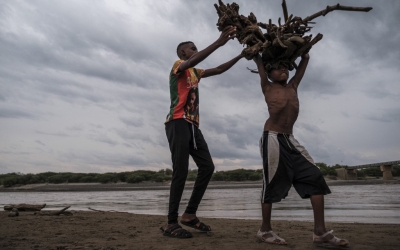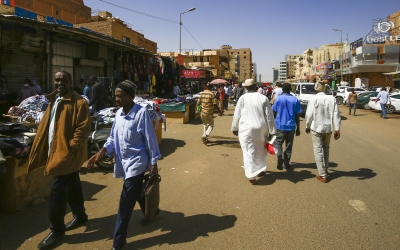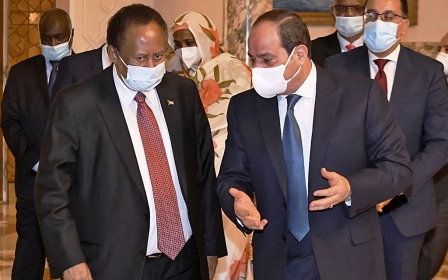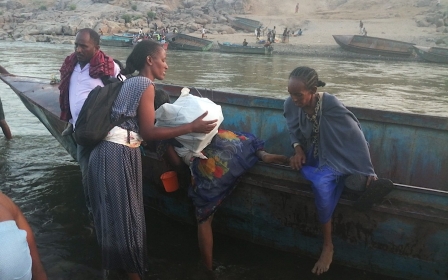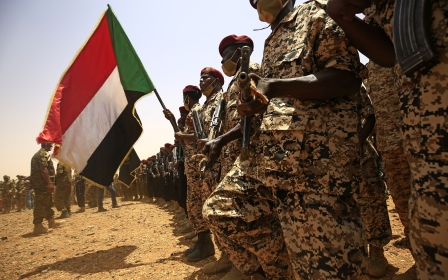Sudan and Ethiopia trade accusations over weapons and bodies as tensions mount
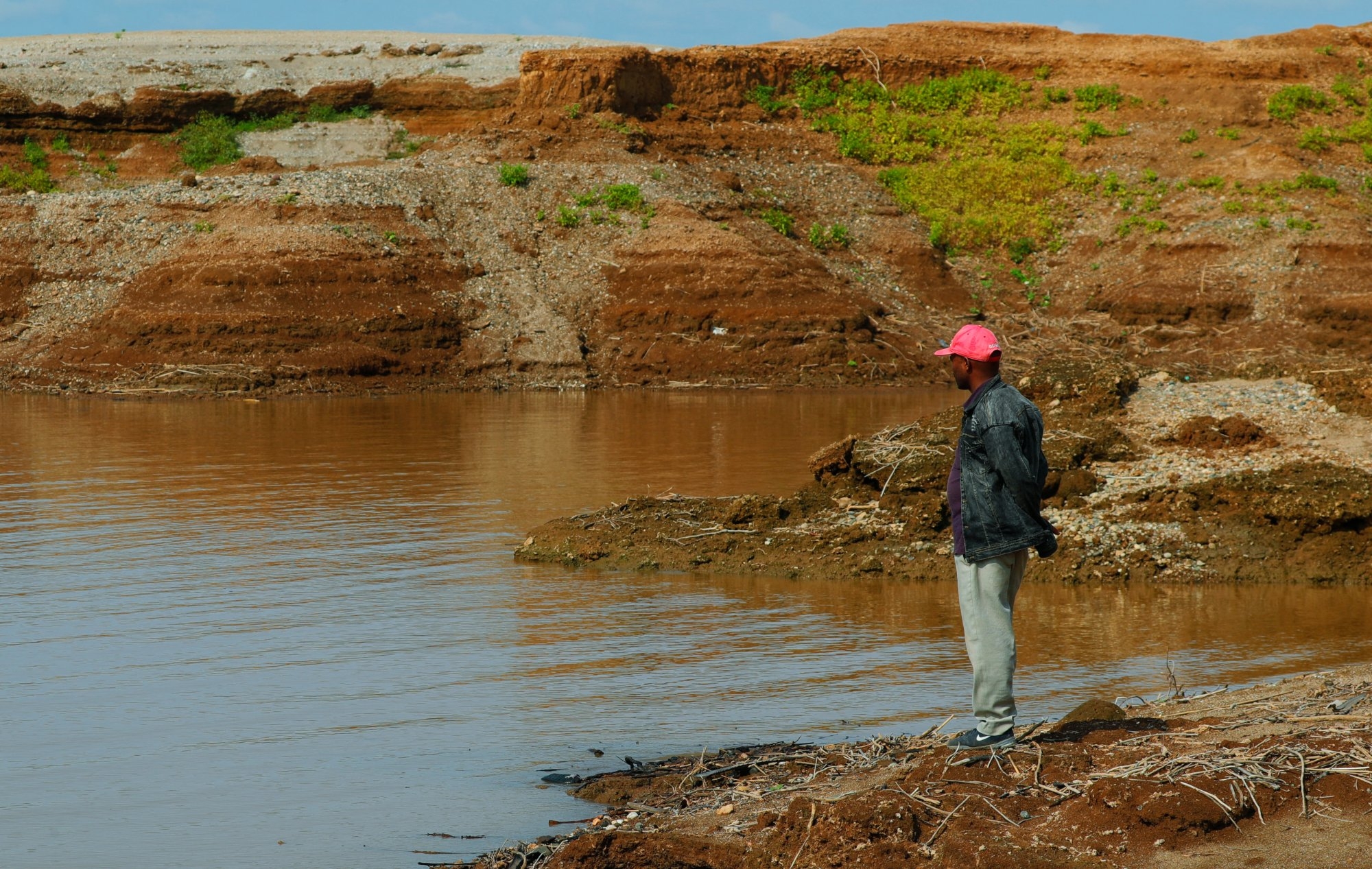
Ethiopia and Sudan have accused each other of waging proxy wars by supporting rebels in the other’s country in recent days, further stoking tensions amid already deteriorated ties between Khartoum and Addis Ababa.
On Monday, two days after Ethiopia accused Sudan of backing rebels from the restive Tigray region seeking to damage the controversial Great Ethiopian Renaissance Dam (GERD), Khartoum claimed that it had seized weapons entering Sudan, shipped from Moscow via Ethiopia.
New MEE newsletter: Jerusalem Dispatch
Sign up to get the latest insights and analysis on Israel-Palestine, alongside Turkey Unpacked and other MEE newsletters
The most recent tragic development however, was the news on Wednesday that 29 bodies had washed up in recent weeks on the Sudanese shores of the Setit river - also known as Tekeze - the natural border between the two countries.
The Sudanese foreign ministry said on Wednesday that the 29 bodies found in the Setit were believed to belong to the Tigray ethnic group and to have been killed in the war currently ongoing between Tigrayan rebels and Ethiopian state forces.
In a statement sent to Middle East Eye, the ministry said that bodies had been retrieved from the river since 26 July, and that Khartoum had informed Ethiopia of the matter on 30 August.
Bodies in the river
The recent developments come as Ethiopia completed the second filling of the GERD, causing widespread damage to crops and buildings in areas of Sudan - while conflict in the contested border territory of al-Fashaga has strained relations between the two neighbours even further.
On Tuesday, Sudanese authorities summoned the Ethiopian ambassador to Khartoum, Yibeltal Aemero Alemu, to inform him of the retrieval of the 29 bodies in the Setit, foreign ministry spokesman Mansour Boulad told MEE.
Residents of the villages of Hamdaiet and Wad al-Hiliou near the border with Ethiopia told MEE that they had found the bodies and that Tigrayan refugees living in the area had identified them.
However, an Ethiopian diplomat denied the claims that the bodies came from Tigray.
“This is fabricated information made up by Tigray in order to sabotage Ethiopia’s reputation in front of the world and bring solidarity to their rebellion by saying that the Ethiopian government is violating human rights,” the source, who requested anonymity, told MEE. “It’s an old trick and we will confront it.”
Weapons dispute
Meanwhile, Khartoum’s claims that Ethiopia helped smuggle weapons into Sudan has only muddied the waters, with Sudanese authorities issuing two contradictory statements on the issue in the span of 24 hours.
A source in the Empowerment Removal Committee, an anti-corruption body set up after the ousting of longtime ruler Omar al-Bashir, said that large quantities of different kinds of weapons coming from Russia had been seized after being funnelled illegally into Sudan through Ethiopia.
However, the Sudanese interior ministry later denied that the weapons shipment had been confiscated, stating that the weapons had entered the country legally.
“What happened were normal checking procedures that happen in such cases, and the shipment is legal,” the ministry said in a statement on Monday.
“The (Sudanese) customs authorities have seized the shipment for checking as a normal procedure and found that the shipment included 73 boxes of gun bullets and 290 rifles,” a police source, who asked for anonymity, stated.
The source added that the shipment belonged to a legal weapons trader in Sudan, but had been held by Ethiopian authorities at Addis Ababa airport since May 2019.
For its part, Ethiopian Airlines has rebuffed the claims of weapons smuggling, emphasising that the shipment was legal and had the full documentation to prove it.
Finally, the Empowerment Removal Committee said in a press release on Tuesday that Sudanese customs and the interior ministry had no right to close the case, calling for a deeper investigation to take place in order to understand the full circumstances around the shipment.
A source from the Empowerment Removal Committee told state news agency Suna that there are doubts over whether the confiscated weapons were intended to support associates of Bashir seeking to destabilise the country and undermine efforts by transitional authorities.
The confusion over the weapon shipment came just a day after Ethiopia accused Sudan of opening its border to allow support - including logistics and weapons - to pour into Tigray. Khartoum rejects the accusation.
“Sudan has nothing to do with the internal disputes between Ethiopian internal entities that may be based on ethnic or national causes, so we believe that Ethiopia is trying to draw attention away from its internal troubles by accusing Sudan of involvement or interference in its domestic issues,” Boulad, the foreign ministry spokesperson, said.
“Sudan strongly condemns Ethiopia’s repeatedly hostile attitude, whose only aim is political,” he emphasised.
“Sudan is in full control of its border with Ethiopia, which is recognised internationally, and would never allow anyone to use it to destabilise neighbouring countries. We also assure the whole world that Sudan has no intention of invading or attacking Ethiopia.”
Foreign intervention?
Meanwhile, a Sudanese official claimed that some regional powers, which he refused to name, were seeking to sabotage ties between Sudan and Ethiopia.
Under condition of anonymity, he told MEE that the currently hostile state of affairs between the two countries, while largely influenced by the situation with the Renaissance Dam and border tensions, was also being stirred up by other players.
“There are external hands exploiting the disputes between military and civilians in Sudan in order to sabotage the ties between Addis Ababa and Khartoum,” he said.
“We are keen not to destabilise Ethiopia, because we believe that the collapse of the state in Ethiopia under the ongoing civil war would have serious consequences on Sudan - as millions of refugees would cross the borders and worsen the already fragile situation in Sudan,” he argued.
“The collapse of Ethiopia would be worse than the construction of the dam, so we are dealing wisely with the situation there, and we have no intention to fuel it because that will harm us as well.”
Cameron Hudson, Atlantic Council senior fellow and former US diplomat in Sudan, meanwhile warned that the consequences of the current climate of mutual accusations could spiral out of control.
“There is increasingly dangerous rhetoric and accusations being levied by both sides against the other. Left unchecked, miscalculations are likely to occur, which could be cataclysmic for both countries and the wider region,” he told MEE.
Nizar Manek, an independent consultant and analyst on the region, warned that the situation in Ethiopia was deteriorating, adding that it would impact the wider region.
“When the war in Tigray erupted late last year, the air in the region was already heavy,” he told MEE. “The current state of proxy conflict between Ethiopia and Sudan was foreseeable since mid-2020, and some of us warned of it in private briefings and in public, but few could grasp this until the sky darkened with smoke.”
Manek said further internal conflict was likely in Ethiopia, making it harder for Sudan not to get sucked in.
“Ethiopia’s entire frontier with Sudan, including the capabilities of armed groups in Benishangul-Gumuz, Gambella, and western Oromia, and their growing relationships in Sudan, is rising in significance within the wider trajectory of Ethiopia’s forever war,” he warned.
Middle East Eye delivers independent and unrivalled coverage and analysis of the Middle East, North Africa and beyond. To learn more about republishing this content and the associated fees, please fill out this form. More about MEE can be found here.


